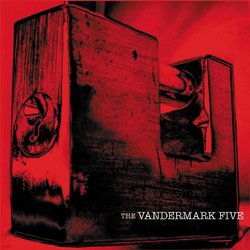| All Artists: Vandermark 5 Title: Elements Of Style, Exercises In Surprise Members Wishing: 0 Total Copies: 0 Label: ATAVISTIC Release Date: 3/31/2009 Genres: Jazz, Pop Style: Avant Garde & Free Jazz Number of Discs: 1 SwapaCD Credits: 1 UPCs: 735286115024, 803680132258 |
Search - Vandermark 5 :: Elements Of Style, Exercises In Surprise
 | Vandermark 5 Elements Of Style, Exercises In Surprise Genres: Jazz, Pop
|
Larger Image |
CD Details |
CD ReviewsVandermark's most reliable unit finds a new voice - it's own Troy Collins | Lancaster, PA United States | 07/15/2004 (4 out of 5 stars) "Although I greatly admire Ken Vandermark's playing and writing in all his various collaborations and projects, I have great difficulty critiquing his music. Conventional wisdom from those less than enamored with Mr. Vandermark's overabundant output simply boil it down to the usual - everything he writes sounds the same. Which in a sense is true. But Ken's writing style is as distinctively his own as say Berne, or Threadgill, or Douglas or even Mingus for that matter. When you hear a Vandermark piece, you know it's his. As a good friend of mine once said - "There are some artists whom you like no matter how lacking their diversity or development is (and/or seems to others) but each new project is like another installment of a magazine you always look forward to reading, no matter how subtle the changes may be." This is precisely how I feel about Ken's work. In his defense, there are numerous ensembles that he runs and/or include him that are very different from each other, but for purposes of this review, I'm referring solely to the Vandermark 5. When the Vandermark 5 was at one time an unruly and unpredictable sort of beast, it is now unfortunately less surprising. This is due mainly to Jeb Bishop's decision to stop playing electric guitar and focus on the trombone. Hence the title of the Vandermark 5's 2001 album - "Acoustic Machine." I spoke to Ken during that tour and he told me that it was the main reason he decided to add baritone sax to his list of instruments, in order to flesh out the arrangements more, since he had to do quite a bit of reworking of his existing charts. This current album finds the group three albums into its current incarnation and finally starting to really hit it's stride creatively. Not that the other two albums they've made since then were bad mind you, they just seemed sort of interchangeable to me.This time out there is a more unified feel to the writing. Most of the tunes are arranged to accentuate the compositions' dynamic extremes. The closest similarity I can think of is how old Pixies tunes would begin with a quiet verse section only to be torn asunder by a raging chorus, it's often reminiscent of that, only in reverse. For example: "Telefon" starts off with a burning free-bop head complete with searing alto solo and rhythm section accompaniment only to stop on a dime, go dead silent and feature only the sounds of a faintly rumbling unaccompanied multiphonic trombone solo. And then just as suddenly the whole group plunges in with Vandermark taking a burning tenor solo to take the song back out again as it began. The majority of tracks on the album seem to jump back and forth in this fashion, less the static stylistic tributes of albums past, i.e., here is the funk tune, here is the bop tune, here is the ballad, etc. Although, there is one ballad on this disc, and it is as subtly beautiful as anything Vandermark has ever written.What really separates this album from the other six Vandermark 5 albums is the final track. It's a 20 minute tour de-force for the group and a condensation of all the variations the album has to offer. From a solo bass and drum intro to stomping full band horn charts on down again to duo and trio pointillistic chamber pairings, it is a virtual set piece for everything the group is capable of. Episodic and linear in a way that Ken's writing often is not, it shows a serious departure for his ensemble writing. It reminds me a great deal of the kind of epic compositions Tim Berne used to write back in the 90's.I normally find it hard to recommend one Vandermark disc over another, as I personally always like them, but this one and this years collaboration with ZU - "Radiale" are both exceptional releases by Vandermark and make worthwhile additions to even a casual fans collection."
|

 Track Listings (7) - Disc #1
Track Listings (7) - Disc #1